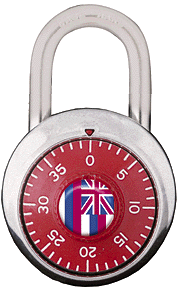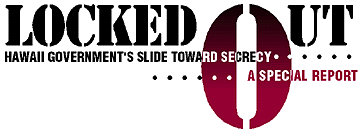


Times change. And the keepers of the flame are worried.
"I see a steady, slow erosion of government openness in the next 10 years," says University of Hawaii journalism professor Gerald Kato.
"Most of our citizens don't think about openness unless they have a problem," says Nancy Monson, executive director of the National Freedom of Information Coalition in Dallas. "We're so willing to give away the store."
"I think most of the signs are ominous," said Honolulu media attorney Jeff Portnoy.
Computerized documents, budget axes and privatization of public records. Closed meetings and 911 tapes. Public apathy.
Many observers agree that government openness is being buffeted as the century draws to a close. And darker clouds loom here and on the mainland.
"I'm not encouraged ..." Portnoy said. "So much is dependent on the leadership shown by the executive. I see us going in the wrong direction."
Portnoy doesn't see "a significant commitment to require state agencies to adopt a philosophy that things should be opened."
House Judiciary Chairman Terrence Tom disagrees: "It's heading in the right direction with openness. And that's good, as long as we don't get to the point where there's no rhyme or reason for what we're doing."
He said public apathy can be traced to a lack of government openness. "We're going to have to work toward restoring public trust in government. A part of that is passing laws to ensure that people know we are sincere in making government more open. When I compare going into politics when I first started out in 1982, I can see a big difference in government openness. People expect more, demand more and they're getting more."
He pointed to "tremendous strides," such as opening ethics hearings.
Kato said Hawaii once had a reputation as a progressive state in terms of open government, but "people are rolling back on that commitment now. I am in some ways very pessimistic. But I hope I'm wrong. ... Openness is a hassle for government, but it's a small price to pay for having a democratic form of government. Some people here don't get it."
Kato said he often hears government belt-tightening used as an excuse for failing to produce documents or expose deliberations to the full light of day.
It's no excuse, he said. "It's more of a mind-set. The spirit of openness."
That spirit is spotty both here and on the mainland.
A proposal to create a Freedom of Information hot line here several years ago, for example, failed to materialize for lack of interest.
"I don't expect too much has changed," Portnoy said.
Leadership of the Office of Information Practices, which issues advisory opinions to state and county agencies and the public about what government records are open, has changed.
Many are unsure what direction the agency will take.
"We had a very active period with Kathleen Callaghan," said Sen. Rey Graulty. "We have yet to hear what the philosophy of her successor - Moya Davenport - is. This last session she was not as visible as Katie was in her prime."
Graulty doesn't foresee any more legislative tinkering with the open-meetings law anytime soon. "Any exceptions to the Sunshine Law need to be narrowly drawn," he said.
Even so, bulldogging government officials is becoming more difficult, contends Edward Basset of the Freedom Forum Media Studies Center. "Few journalists are well-enough trained" in investigative reporting in a computer age, he said. "There's just too much stuff to wade through now. You have to be just as bright as the specialist you're talking to."
And Basset said few media owners are willing to pay for the pursuit of sunshine.
Monson sees computerization and privatization of public records - everything from birth information to government agency budget figures - as formidable barriers to access. "It's like we have to fix it after it's (computerization) been done. Citizens are told they have to pay a huge amount of money to get a software program to get the information out of the computer."
Some companies are even copyrighting the public information they computerize, she said. And some government entities are looking to make money on computerized catalogs of information.
Monson also sees the privacy pendulum swinging too far from the public's right to know.
There has been legislation to curb access to records because of a fear of crime, she said, adding that officials should be going after the criminals, not shutting down information.
Monson said the ease of international communication via the Internet also poses the threat that other countries could impose their less stringent openness standards on us.
But she sees a ray of hope: public skepticism. "We seem to have a desire to know what politicians are doing right now because people are so disgusted," she said. "I think this is an opportunity to get people up to speed on the issues and get them to support First Amendment rights."